On the lead boat, Mr. Le Tan Luc, the chief officiant of the Fishing Festival in My Quang fishing village (Tuy An Nam commune), gently raised an incense stick and respectfully offered prayers. The fragrant smoke rose and mingled with the salty sea breeze, spreading across the vast expanse of sea and sky.
On the remaining boats, the people respectfully turned their hearts towards the sea, their faces reflecting a sacred devotion. It seemed that in that moment, an invisible thread connected the fishermen with their ancestral roots, with the guardian deity, the Whale God, and with their yearning for peace amidst the vast ocean waves.
Mr. Luc gazed out at the vast ocean, his deep, warm voice blending with the sound of the waves: "We go to the sea to perform the Nghinh Ong ceremony to pray for the deity to witness the sincerity of the villagers, to thank him for his benevolent protection that ensures the safety of the people at sea and a bountiful catch of shrimp and fish."
"Ông" or "Ông" (meaning "Mr." or "Ông" in Vietnamese folklore) is how fishermen in the fishing village respectfully refer to the whale – a sacred deity of the South Sea according to folk beliefs. Having spent their lives exposed to the sea, the people of My Quang fishing village have faced numerous dangerous storms and typhoons, yet, as if by magic, the worst has turned into good fortune. These escapes have further strengthened the villagers' belief in the sacredness of the whale. "There were times when we were fishing far out at sea and encountered storms; I, like everyone else in the village, thought we wouldn't make it back. But thanks to Ông's protection, we were lucky to escape..." Mr. Luc said, gazing towards the vast ocean, his voice hoarse with reverence.
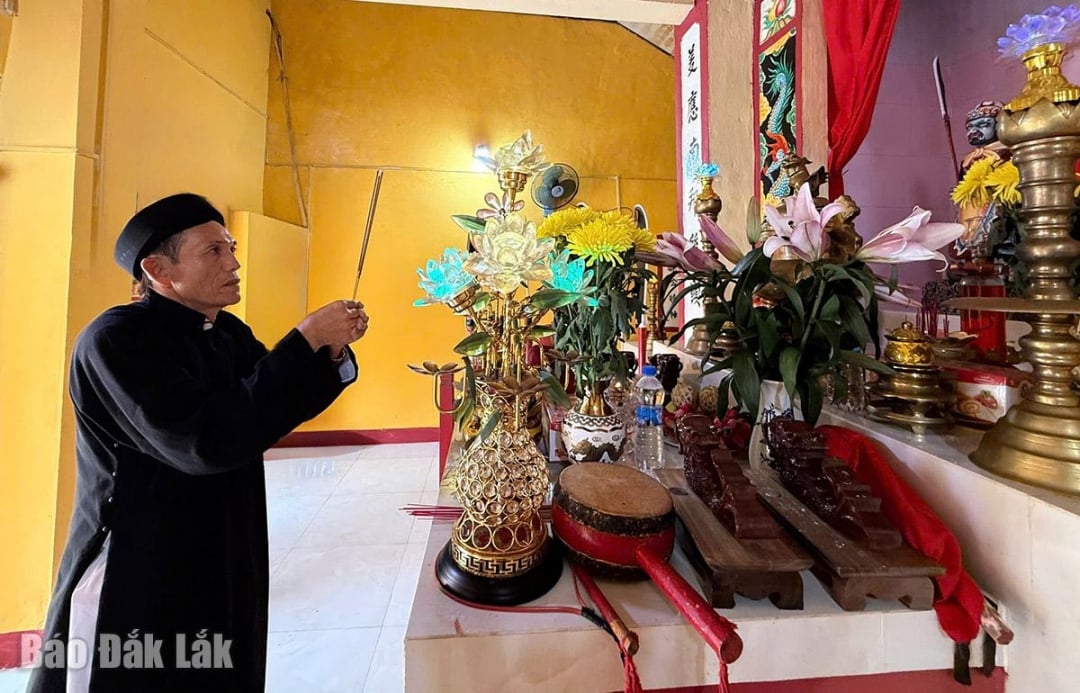 |
| Following in his father's footsteps, Mr. Le Tan Luc devoted himself to maintaining the ancestral worship and rituals at My Quang Mausoleum. |
Mr. Luc's family has been closely connected to the sea for generations. From his grandfather and father to his four brothers, they have all relied on the sea for their livelihood. In the past, his father, Mr. Le Nhe (known as Mr. Tam Phoi by the villagers), was literate and knowledgeable about rituals and ceremonies, often undertaking the ceremonial aspects of important village occasions. After his father's death, Mr. Luc continued the tradition and shouldered this responsibility.
In the past, Mr. Luc toiled tirelessly at sea, struggling to provide for his family's basic needs and education. For nearly a decade now, with his family's finances more stable, he has put down his oars and nets, devoting his energy to village and community affairs. He, along with members of the My Quang Village Management Board, has mobilized villagers and appealed to philanthropists to contribute to the construction of the My Quang Ancestral Mausoleum, making it increasingly magnificent. For Mr. Luc, building the mausoleum, performing rituals, and maintaining the ancestral worship is not only the responsibility of an elder in the village but also a lifelong aspiration to repay the merits of his ancestors and the grace of the Southern Sea deity.
A few days earlier, the fishing village of Long Thuy (Binh Kien ward) was also bustling with the atmosphere of the Fishing Festival. The sound of drums and gongs echoed through the tranquil seaside village, inviting the eager footsteps of tourists from all over and those who had left their hometowns to return. To ensure the ceremony was complete, Mr. Nguyen Cho - the head of the Long Thuy fishing village committee - played the main role. Mr. Cho is short and stocky, his dark skin bearing the marks of wind, frost, and decades of tireless seafaring. At sixty years old, although he no longer directly goes out to sea, the spirit of the ocean remains intact within him.
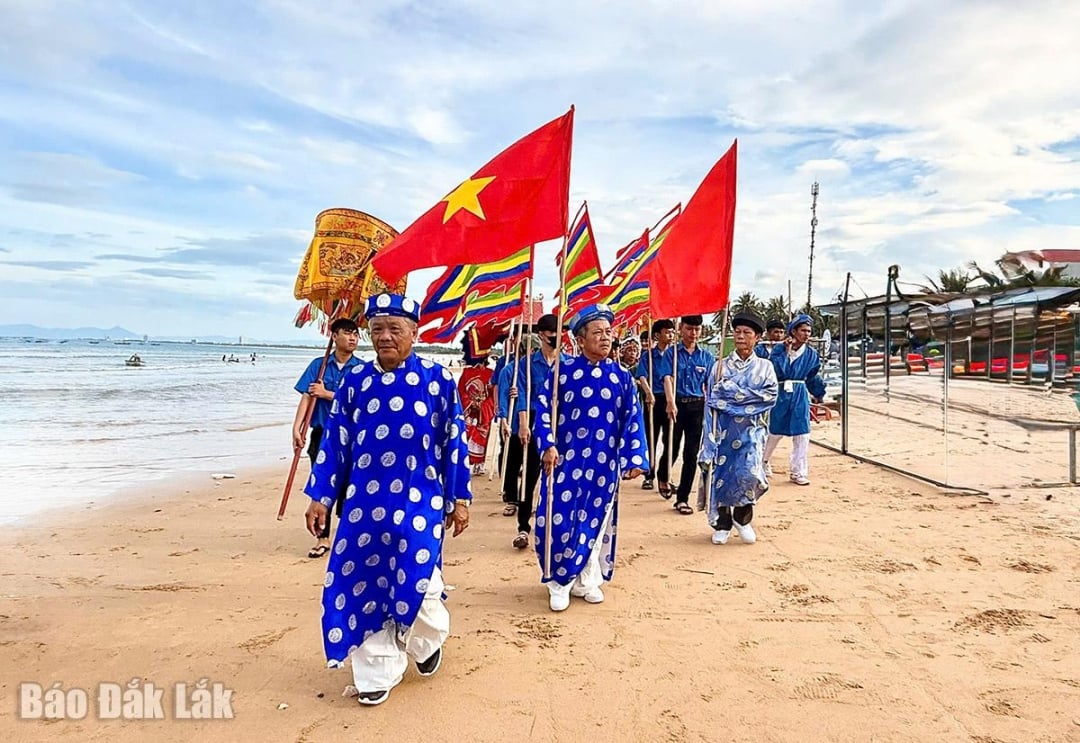 |
| Chief Nguyen Cho leads the procession to welcome the deity during the Fishing Festival in Long Thuy fishing village. |
For many years, Mr. Cho has taken the lead in managing village affairs as a way of showing gratitude to the sea and his ancestors. Having dedicated half his life to the Fishing Festival, he knows every ritual by heart, from the initial offering, welcoming the deity, paying respects to the ancestors, to the summoning of spirits... As the village head, he doesn't hesitate to go door-to-door, mobilizing villagers to contribute their labor and resources so that the festival can be held fully and its traditions preserved. Mr. Cho thoughtfully said, "The sea provides us with food and clothing, and the God of the South Sea protects and saves fishermen whenever there are strong winds and waves. This ceremony is not only to thank the deity, but also to help the younger generation understand the meaning and affection of their ancestors for the sea and the deity who has protected and blessed them." He smiled gently, his sun-tanned face brightening, "Money is limited, but everyone contributes their labor and effort. The sense of community and neighborly love is very warm!"
Amidst the current whirlwind of urbanization, the Fishing Festival quietly preserves the spirit of the sea in the lives of the fishing villages in eastern Dak Lak , serving as an enduring spiritual source and nurturing the unique identity of a maritime culture that remains deeply ingrained in the community's memory. |
The festival is maintained not only through solemn rituals but also through the sincere hearts of the fishermen, creating a space rich in community spirit and emotion. “I was truly surprised and moved to witness the festival in this coastal village. From the elderly to the young, everyone was neatly dressed in their traditional attire, solemn in each ritual. The way they carried the deity, offered sacrifices, and directed their devotion towards the sea showed that this is not just a simple ritual, but an integral part of the spiritual life of the fishermen,” expressed Ms. Nguyen Mai Anh, a tourist from Ho Chi Minh City.
The Fishing Festival is not only preserved through solemn rituals and traditional beliefs, but also enlivened by unique forms of folk performance. Among them, the "ba trao" singing (also known as "ba trao" in some places) is a typical performance where fishermen express their faith and aspirations for peace amidst the vast ocean. As the chants resound, harmonizing with the rhythm of drums and oars, calloused hands accustomed to holding nets now move rhythmically in the lively "ba trao" dance before the shrine of Ông: "The horizon is vast and hazy (la hu la khoan)/ Homeland is the sea (la hu la khoan)/ Our boats are our home (la hu la khoan)." ... In that moment, the fishermen, playing the roles of the Chief Steward, Chief Bowman, Boatman, etc., vividly recreate the journey of making a living at sea.
Currently, there are more than 40 shrines dedicated to the Whale God in the coastal fishing villages of the province. From January to June of the lunar calendar each year, the atmosphere of the fishing festival is bustling throughout these coastal villages; depending on the conditions of each place, the festival can last from 3 to 6 days. Many fishermen are not only skilled in fishing but also knowledgeable about and participate in performing the "ba trạo" folk songs, such as: Meritorious Artist Huynh Van Minh (My Quang stream), Meritorious Artist Nguyen Trong Tich (Long Thuy stream)... For many years, they have quietly preserved and taught "ba trạo" singing, contributing to the soul and preserving the unique cultural beauty of the Fishing Festival in the fishing villages and among the coastal residents.
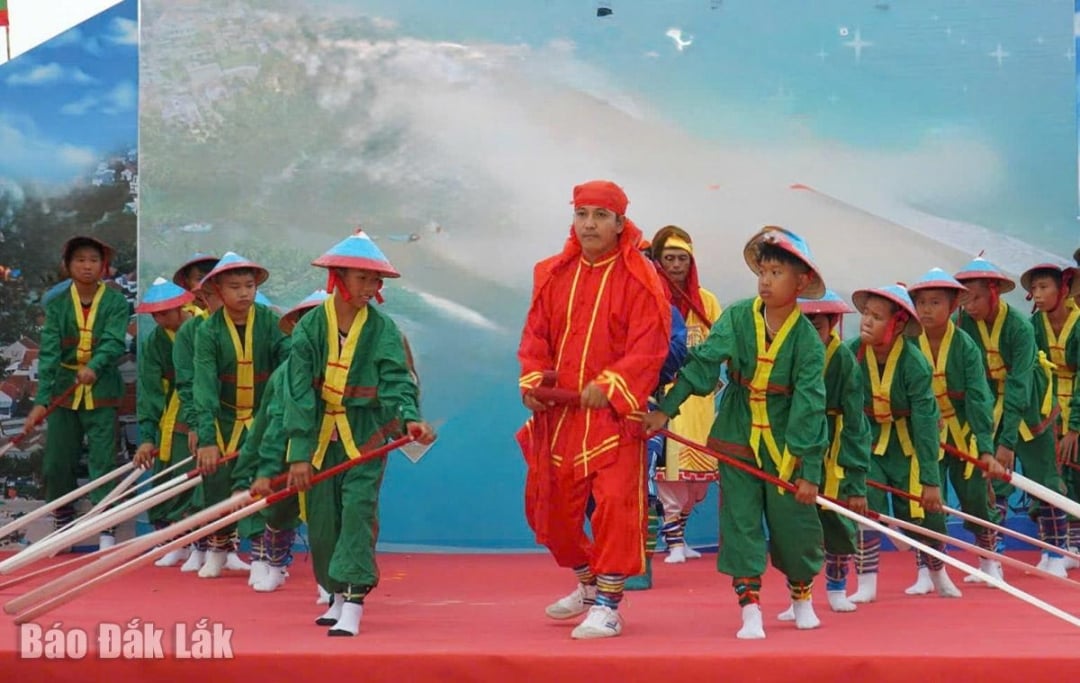 |
| Hò bà trạo is a unique form of folk performance in the Fishing Festival ritual. |
Mr. Nguyen Hoai Son, a researcher of folk culture, shared: The Cau Ngu Festival is one of the unique intangible cultural heritages, vividly reflecting the religious identity of coastal residents in Central Vietnam in general and Phu Yen (formerly) in particular. This is not only an occasion for fishermen to express their gratitude to the sea, but also a profound expression of the sacred bond between humans and the ocean – where they entrust their spiritual faith to the benevolent deity, the Whale God, praying for protection and blessings on each fishing trip. In 2016, the Cau Ngu Festival of Phu Yen (formerly) province was recognized by the Ministry of Culture, Sports and Tourism as a National Intangible Cultural Heritage.
According to Mr. Nguyen Hoai Son, the establishment of shrines and the organization of funeral ceremonies whenever a whale dies is a profound expression of gratitude from fishermen to their guardian deity in the ocean. The Fishing Festival is not just about religious beliefs, but also a space for community bonding; in the fishing villages, fishermen meet, share seafaring experiences, foster neighborly bonds, and gain more confidence and strength to venture out to sea, maintain fishing grounds, and contribute to protecting the sacred sovereignty of the nation's seas and islands.
Source: https://baodaklak.vn/phong-su-ky-su/202507/nhung-nguoi-giu-hon-cua-bien-93915ee/
















































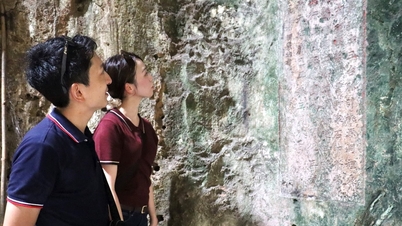





























































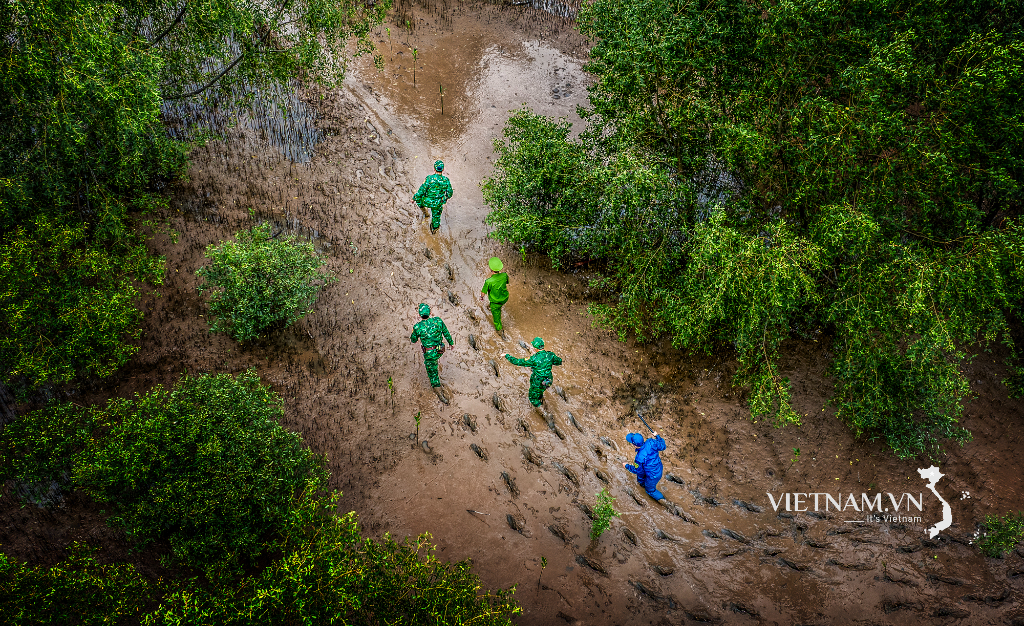

Comment (0)